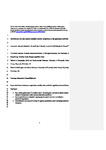Survived but not safe: Marine heatwave hinders metabolism in two gastropod survivors
| dc.contributor.author | Hemraj, DA | |
| dc.contributor.author | Posnett, NC | |
| dc.contributor.author | Minuti, JJ | |
| dc.contributor.author | Firth, Louise | |
| dc.contributor.author | Russell, BD | |
| dc.date.accessioned | 2020-09-15T07:27:07Z | |
| dc.date.available | 2020-09-15T07:27:07Z | |
| dc.date.issued | 2020-12 | |
| dc.identifier.issn | 0141-1136 | |
| dc.identifier.issn | 1879-0291 | |
| dc.identifier.other | 105117 | |
| dc.identifier.uri | http://hdl.handle.net/10026.1/16257 | |
| dc.description.abstract |
Marine heatwaves (MHWs) are an emerging threat to marine organisms that have increased in frequency and magnitude in the past decade. These extreme heating events can have differential impacts on organisms with some experiencing mortality while others survive. Here, we experimentally exposed two species of subtidal gastropod (Trochus sacellum and Astralium haematragum) to two realistic intensities of MHW to test the ability of different species to physiologically cope with extreme heating events. Extreme MHW conditions caused 100% mortality in both species within five days. While both species survived under moderate MHW conditions they showed evidence of nonadaptive metabolic depression. Both species demonstrated an inability to upregulate their metabolic rates at the higher temperatures following exposure to a MHW (i.e. reduced temperature of maximum metabolic rate; TMMR), suggesting a lack of molecular protective responses and ongoing physiological damage. Therefore, the physiological damage endured by heatwave survivors may lessen their ability to cope with subsequent stress until fully recovered. Repairing this damage may have serious repercussions for the rate of recovery of these normally resilient species and their ability to maintain their ecological functions post MHW, especially under the predicted increasing frequency, duration and magnitude of MHWs. | |
| dc.format.extent | 105117-105117 | |
| dc.format.medium | Print-Electronic | |
| dc.language | en | |
| dc.language.iso | en | |
| dc.publisher | Elsevier BV | |
| dc.subject | Marine heatwave | |
| dc.subject | Metabolic regulation | |
| dc.subject | Nonadaptive metabolic depression | |
| dc.subject | Thermal history | |
| dc.title | Survived but not safe: Marine heatwave hinders metabolism in two gastropod survivors | |
| dc.type | journal-article | |
| dc.type | Journal Article | |
| plymouth.author-url | https://www.webofscience.com/api/gateway?GWVersion=2&SrcApp=PARTNER_APP&SrcAuth=LinksAMR&KeyUT=WOS:000589576300009&DestLinkType=FullRecord&DestApp=ALL_WOS&UsrCustomerID=11bb513d99f797142bcfeffcc58ea008 | |
| plymouth.volume | 162 | |
| plymouth.publication-status | Published | |
| plymouth.journal | Marine Environmental Research | |
| dc.identifier.doi | 10.1016/j.marenvres.2020.105117 | |
| plymouth.organisational-group | /Plymouth | |
| plymouth.organisational-group | /Plymouth/Faculty of Science and Engineering | |
| plymouth.organisational-group | /Plymouth/Faculty of Science and Engineering/School of Biological and Marine Sciences | |
| plymouth.organisational-group | /Plymouth/REF 2021 Researchers by UoA | |
| plymouth.organisational-group | /Plymouth/REF 2021 Researchers by UoA/UoA07 Earth Systems and Environmental Sciences | |
| plymouth.organisational-group | /Plymouth/Users by role | |
| plymouth.organisational-group | /Plymouth/Users by role/Academics | |
| dc.publisher.place | England | |
| dcterms.dateAccepted | 2020-08-11 | |
| dc.rights.embargodate | 2021-8-15 | |
| dc.identifier.eissn | 1879-0291 | |
| dc.rights.embargoperiod | Not known | |
| rioxxterms.versionofrecord | 10.1016/j.marenvres.2020.105117 | |
| rioxxterms.licenseref.uri | http://www.rioxx.net/licenses/all-rights-reserved | |
| rioxxterms.licenseref.startdate | 2020-12 | |
| rioxxterms.type | Journal Article/Review |


